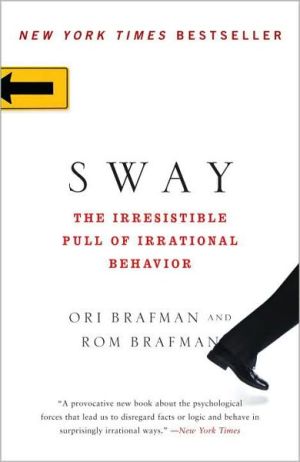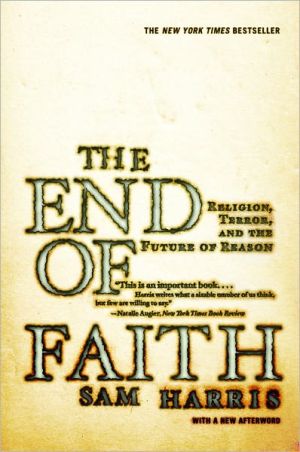Denialism: How Irrational Thinking Harms the Planet and Threatens Our Lives
"A superb and convincing work."\ -Malcolm Gladwell\ At a time when our planet is in dire peril, Americans mistrust science more than ever. Few journalists appreciate what is at stake better than Michael Specter, who has spent the last twenty years reporting on everything from the AIDS epidemic to the digital revolution. In Denialism, he eloquently shows how, in a world where protesters march against childhood vaccines and Africans starve to death rather than import genetically modified...
Search in google:
"A superb and convincing work." -Malcolm Gladwell At a time when our planet is in dire peril, Americans mistrust science more than ever. Few journalists appreciate what is at stake better than Michael Specter, who has spent the last twenty years reporting on everything from the AIDS epidemic to the digital revolution. In Denialism, he eloquently shows how, in a world where protesters march against childhood vaccines and Africans starve to death rather than import genetically modified grains, we must reconnect with the rational thinking that has underpinned the advance of civilization since the eighteenth century. What emerges is a manifesto that brilliantly captures one of the pivotal clashes of our era. The New York Times - Janet Maslin In this hotly argued yet data-filled diatribe, Mr. Specter skips past some of the easiest realms of science baiting (i.e., evolution) to address more current issues, from the ethical questions raised by genome research to the furiously fought debate over the safety of childhood vaccinations.
Introduction 11 Vioxx and the Fear of Science 232 Vaccines and the Great Denial 573 The Organic Fetish 1034 The Era of Echinacea 1475 Race and the Language of Life 1876 Surfing the Exponential 225Acknowledgments 265Notes 269Bibliography 275Index 281
\ From Barnes & NobleAs a longtime New Yorker staff writer specializing in science issues, Michael Specter has recognized a growing trend among Americans to distrust institutions and view science as belonging to this category -- or, even worse, as a political constituency or a self-seeking lobby. In Denialism, he describes how science's traditional functions as information provider and lifesaver have been undermined by heated controversies involving everything from childhood vaccines and research involving animals to stem-cell research and global warming. As relevant as this morning's news.\ \ \ \ \ Janet MaslinIn this hotly argued yet data-filled diatribe, Mr. Specter skips past some of the easiest realms of science baiting (i.e., evolution) to address more current issues, from the ethical questions raised by genome research to the furiously fought debate over the safety of childhood vaccinations.\ —The New York Times\ \ \ Although denialists, according to Specter, come from both ends of the political spectrum, they have one important trait in common: their willingness to “replace the rigorous and open-minded skepticism of science with the inflexible certainty of ideological commitment.” Specter analyzes the consequences of this inflexibility and draws some startling and uncomfortable conclusions for the health of both individuals and society. For example, though every reputable scientific study demonstrates the safety of major childhood vaccines, opponents of childhood immunization are winning the publicity war; childhood immunizations are tumbling and preventable diseases are increasing, often leading to unnecessary deaths. Specter, a New Yorker science and public health writer, does an equally credible job of demolishing the health claims made by those promoting organic produce and all forms of “alternative” medicine. Specter is both provocative and thoughtful in his defense of science and rationality—though he certainly does not believe that scientists are infallible. His writing is engaging and his sources are credible, making this a significant addition to public discourse on the importance of discriminating between credible science and snake oil. (Nov. 2)\ \ \ \ \ Written in a journalistic style similar to Malcolm Gladwell's Blink, this is a self-proclaimed polemic against all who would deny the promise and progress of science, people whom the author calls "denialists." Using the word to refer to a range of people and views, Specter, a New Yorker staff writer who focuses on science, technology, and public health, argues they "replace the rigorous and open-minded skepticism of science with the inflexible certainty of ideological commitment." Much of what Specter writes is good and true. People are not good judges of risk. Vaccinations are vital to people's health. And politics and ideology should not replace science. Yet Specter's extreme scientific exceptionalism, his oversimplification of complex issues and historical episodes, and his near-comical characterization of the denialist make this a hard pill to swallow. VERDICT Many, especially the skeptical and the scientifically inclined, will find arguments that trade on generalities, ignore subtleties, and caricature the opposition suspect. Thus, Specter's book is unlikely to ring true to the believer in science or to convert the unbeliever. Not recommended.—Jonathan Bodnar, Georgia Inst. of Technology Lib. & Information Ctr., Atlanta\ \ \ \ \ From New Yorker staffer Specter, a sarcasm-drenched denunciation of all who will not kneel at the altar of science. "Denialists," as Specter calls such people, "shun nuance and fear complexity, so instead of asking how science might help resolve our problems, they reject novel strategies even when those strategies are supported by impressive data and scientific consensus." Never mind that consensus once supported the idea of an Earth-centric universe and of epilepsy as a sign of demonic possession, and never mind Specter's own lack of nuance in lumping climate-change deniers, GM-food opponents, anti-vaccination activists and other such types into a single category. Are those who worry about the prospect of eating genetically altered food really on a par with Holocaust deniers? Specter seems glad to equate them, and to accuse any such worriers of being glad to condemn African villagers to lives of famine and misery. Are organic foodies evil? Apparently so ("the Western cult of organic food is nothing more than a glorious fetish of the rich")-never mind the fact that nonorganic farming is an innovation scarcely a century old and that eating fossil fuel is not very good for anyone. Specter rolls a few fuzzy-math dice along the way-at one point he gives the appearance that the 2,000-odd Americans who died of aspirin poisoning in 2008 were merely victims of bad luck-and he advances a few straw-man lines of argument that would make a college-composition student blush. Readers will need to be comfortable with the idea that Big Pharma loves them, corporate culture cares, industrial agribusinesses are in it for the public good and bacteriologists stand next to the Godhead. Denialism, it wouldseem, includes denying that science has ever caused harm. Specter's spirited approach to his subject is admirable, but his brush is far too broad and his disdain far too deep.\ \








